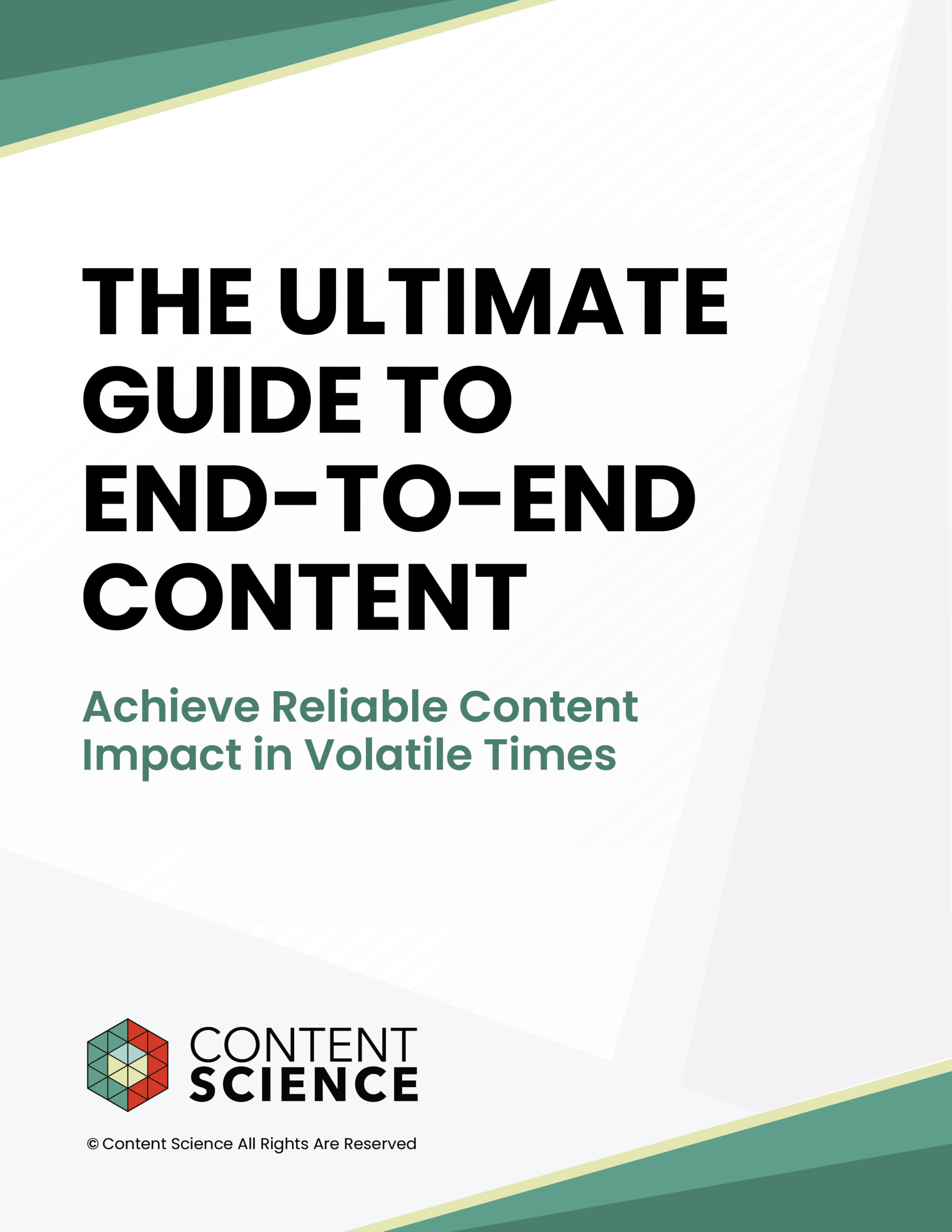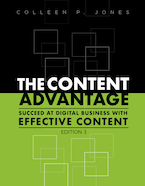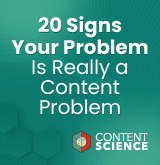
Content marketing is at the cornerstone of what we do at Content Science Review, so it was high time we updated one of our most popular fact sheets that focused on – you guessed it – content marketing. Below, a collection of facts, statistics, and bits of knowledge to elevate your content strategy.
Colleen Jones, author of The Content Advantage and Clout, defined the difference between content marketing and content strategy as:
Content strategy is essential for a wide range of purposes—media products, technical support, customer service, sales, and marketing, to name a few. Content marketing focuses on strategy and implementation for—you guessed it—marketing. — Has Content Marketing Hijacked Content Strategy?
Content marketing forms one part of an overall content strategy where an organization actively uses content to provide information of value to an audience on a continuous basis. And content marketing’s goal? To influence people to take action—without sounding salesy—in order to drive specific, desired kinds of customer behavior.
This is an area in which many organizations struggle. For example, Kapost estimates that about half the organizations that participated in a self-assessment survey about content operations say they’re at the reactive or siloed phase. So, while we see some intentionality emerging, most of these organizations still describe themselves as chaotic, lacking a clear strategy, and subject to disjointed process.
Content marketing is any marketing technique whereby media and published information (content) are used to influence buyer behavior and stimulate action leading to commercial relationships. Optimally executed content marketing delivers useful, relevant information assets that buyers consider a beneficial service rather than an interruption or a “pitch.” — IDC
That means content marketing differs from traditional marketing, public relations, and communications practices. Creating content marketing similar to sales presentations or traditional marketing collateral won’t work. Instead, think of content marketing more like publishing. The reality is, all brands are now publishers. And as more brands recognize the potential of content marketing, they are devoting more budget, time, and resources to this rapidly evolving area of marketing.
In a recent survey by Adobe, Amazon Web Services, and the IBM Institute for Business Value (IBM IBV), nearly 2,000 executives in 9 countries indicated that the top reason their organizations would invest in CSC improvements are enhancing customer experience, increasing brand differentiation, and improving productivity. Yet, 9 in 10 said they need easier access to their own organization’s content assets, and 75% said they needed to improve the delivery of consistent customer experiences across channels. – IBM
95% of B2B marketers have a content strategy.“This year, 22% of B2B marketers characterize the success of their content marketing as extremely or very successful.” – Content Marketing Institute
Legislation and signal loss have had a material impact on media planning and buying: Almost 90% of ad buyers report that their personalization strategies, ad investment costs, and mix of data across first-, second-, and third-party sources are being redesigned, according to IAB. As an alternative to the hard-to-measure merit of traditional advertising and one-way communications, content marketing is a much more effective means of marketing. It creates more relevant content and better two-way customer relationships all throughout the customer lifecycle in a non-threatening, non-salesy way.
In 2024, US B2B marketers said they’d spend $8.71 billion on martech, marking a 13.4% increase YoY. In addition, B2B martech spending accounted for nearly a one-third of overall martech spending in 2024. — EMARKETER
This shift in reliance on digital media for B2B marketing will result in higher percentages of marketing budgets allocated for content marketing—so much so that the content marketing market size is forecast to increase by USD 539.3 million at a CAGR of 13.9% between 2024 and 2029. — Technavio
70% of companies are increasing content marketing investment, with 43% increasing staff levels. — Curata
Breaking content marketing down between B2B and B2C, Content Marketing Institute reveals in their B2B Content Marketing Benchmarks, Budgets, and Trends: Outlook for 2025 that 46% of [of B2B marketers] think their content marketing budget will increase in 2025 when compared with 2024 (last year, 45% thought their budget would increase).
In 2024, 46% [of B2B marketers] predicted that their content marketing budget would increase in 2025. — Content Marketing Institute
As for B2C, a MarketingProfs and Content Marketing Institute study reports that 47% of B2C respondents thought their content marketing budget would increase in 2023. 40% thought their budget would stay the same.
“One in two workers feel they lack access to the right content creation tools at work. For 56% of those who do have access, uncertainty often remains about how to maximize their potential due to limited training and support.” — The Drum
This is actually good news for your organization and should ring loud and clear as an opportunity. If you take the time to articulate your content marketing business goals and strategy, study successful content marketing execution, and understand how to evaluate your success, you will become part of the fruitful minority of organizations that execute properly. Consider this stat: Less than a third of companies surveyed in CMI’s 2025 B2B report (29%) said their content strategy is extremely or very effective.
“There’s never been a more exciting time to be a marketer, whether you’re working at a large enterprise Fortune 500 or a founder-led startup. AI is making teams more efficient, freeing up their ability to ideate and dream bigger…” — Krystal Hauserman
Division of content is another important point to consider. Content marketers, on average, aim for 61% created content, 27% curated, and 12% syndicated, according to Curata.
Social media is also emerging as a major player in the content marketing game. Content Marketing Institute shows 82% of B2C content marketers use social media, while 80% of B2B content marketers do so. Their efforts are not going unnoticed. 90% of Instagram followers follow a brand and want to connect.
Content Marketing Institute reports that 95% of B2C content marketers use social media. — Content Marketing Institute
89% of B2B content marketers leverage social media for distribution. — Content Marketing Institute
70% of shoppers look to Instagram for their next purchase. — ProductLondon
While you might hear a lot of hype about content marketing, always remember it is a timeless principle. It existed in the 1800s, the 1900s, and now the 2000s. John Deere did something brilliant yet simple in 1895—they informed and educated farmers in a compelling way with useful, relevant content. And that content helped John Deere become a credible, trusted, and reliable brand.
Too often, content marketing fails because organizations like to talk about themselves and their products. Or, organizations focus on new technologies, tools, platforms, and channels like shiny toys, or worse, SEO snake oil. Instead, if you understand the timeless principles of content marketing, you will thrive no matter what technology, tools, and trends crash around you like rapids in a river.
When some organizations become enthusiastic about content marketing, they believe it means upping the amount of content creation and blasting it everywhere. Marketing agencies and SEO teams often encourage this attitude, but more content does not equal better content marketing. Consider just how much content is out there: millions of blogs get published every day. And there is no slow down in sight.
Paradoxically, it’s actually easier to give people too much content—but that content volume backfires when your audiences ignore it. That’s because people respond better to more focused and targeted content.
Most readers spend only 37 seconds reading an article online. – NewsCred Insights
That’s why it’s important to present your readers with targeted, bite-sized bits of content. You need to understand your audience thoroughly and know exactly what they want. For example, bloggers report that interviews and roundups have become less popular, the popularity of video in blogs has doubled in the last decade, and most bloggers write posts between 500-1500 words according to Orbit Media.
Taking that point further, Gartner predicts that marketers will stop using content consumption as a gauge of where a reader is in the buyer’s journey, as many different factors affect the B2B buying cycle. (Plus, your site doesn’t exist in a vacuum!).
The importance of optimizing your customer experience and user journeys cannot be overstated. In fact, integrated customer journeys give you a massive competitive advantage, sometimes doubling sales year of year, Kapost found.
Yet it’s not a given.
C-suite leaders who work in the customer experience, satisfaction or service departments in their companies are more likely to list improving customer loyalty (40%) and improving customer service (36%) among their top goals for the year. Yet, they also report issues with converting data insights in new services, products or experiences as a main challenge (47%). — Publicis Sapient
The top 10 (content) marketing challenges:
- Gaining new customers
- Recruiting talent and retaining and training the marketing team
- Selecting the most effective marketing tactics
- Budgeting for marketing campaigns
- Refining messaging for differentiation
- Measuring the ROI of campaigns
- Facing increased competition
- Keeping up with global market changes
- Working with a lack of resources
- Finding the right tools — CMO
So what makes a content marketer?
Conventional wisdom states that traditional marketers, public relations specialists, and communications specialists are natural content marketers. But content marketing skill sets often more closely match those of traditional publishing, (i.e. those who work for newspapers, magazines, trade publications, and other media companies). These groups have worked as content marketers for many years without necessarily using that term.
In building your content teams, consider journalists, editors, publishers, and other people with media-related experience who already boast many of the skills you need.
The majority of content teams consist of six members or fewer and have more diverse roles. We continue to see an increase in higher-level content roles. Also, more organizations have leadership roles such as content manager and director and some organizations have executive level content roles. — Content Science, Content Operations Study
In addition to finding trained content marketing professionals, it takes sound leadership for content marketing teams to thrive. The top five capabilities needed in content leaders are: vision, collaborate with others, synthesize information, motivate the team, and cross-functional expertise. With strong leadership in place, your content marketing team is one step closer to building long-term success.
With the right leadership, goals, foundation, best practices, talent, and evaluation process, content marketing can become a critical weapon in your organization’s arsenal. The good news? There is still time to leap ahead of your competition while they flail at execution.
Events, Resources, + More
The Ultimate Guide to End-to-End Content
Discover why + how an end-to-end approach is critical in the age of AI with this comprehensive white paper.
The Content Advantage Book
The much-anticipated third edition of the highly rated book by Colleen Jones is available at book retailers worldwide. Learn more!
20 Signs of a Content Problem in a High-Stakes Initiative
Use this white paper to diagnose the problem so you can achieve the right solution faster.
Upskill with Content Science Academy
Training for modern content roles through on-demand certifications + courses or live workshops.






Comments
We invite you to share your perspective in a constructive way. To comment, please sign in or register. Our moderating team will review all comments and may edit them for clarity. Our team also may delete comments that are off-topic or disrespectful. All postings become the property of
Content Science Review.